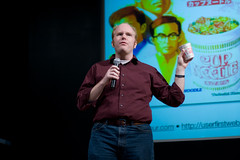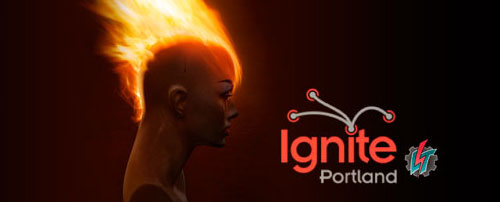 I’ve given a lot of presentations, but nothing compares to Ignite. Preparing for an Ignite presentation requires a different methodology.
I’ve given a lot of presentations, but nothing compares to Ignite. Preparing for an Ignite presentation requires a different methodology.
Last June I gave a presentation at Ignite Portland 3 on Cup Noodle: Innovation, Inspiration and Manga. You can watch the original presentation on YouTube.
What you won’t see from the video is that up to an hour before I left for the theater, I had not yet successfully rehearsed my presentation. Here’s why.
I treated this like any other speaking engagement. I started with an outline of what I wanted to say. I then built slides to the outline and worked on speaker’s notes to go with the slides.
I then read aloud my speaker’s note and refined them until each set of speaker’s notes fit perfectly into the 15 seconds I had for each slide. I did this over a couple of nights and thought that I was in good shape.
Then I rehearsed it and failed miserably.
I couldn’t even get past the first slide without screwing up. And once I screwed up, I couldn’t get back on track.
Here is what I didn’t realize:
- My presentation voice and writing voice are very different — I was already aware of this from other presentations, but in other presentations there wasn’t a penalty for stumbling over words or finding that something takes longer on stage than when I read it to myself.
- You will stumble. What’s important is how you recover. — By scripting everything so carefully including transitions from slide to slide, when I stumbled I couldn’t recover easily. I had to find my place again. By the time I did that, I had runaway slides to catch up with.
- Improv Editing. — Ignite is as more about editing than presenting. When you stumble, you have to make up time somewhere. You have to be comfortable changing the script to make up time or fill time.
So I threw out my speaker’s notes and did the following:
- Picked key concepts and formations I wanted to use on each slide — Instead of sentences, I worked on key things I wanted to say like “3 reasons: Great Lessons, Japanese Comic Book, and Less Time to Cook than an Ignite Presentation.” I didn’t care how I said those three things, just that those were the points.
- Rehearse. Rehearse. REHEARSE! — Find a place where you won’t disturb anyone. Stand up and give your presentation like you’re in front of the audience. And do it as many times as possible.
- No Notes! — Don’t use notes when you rehearse. Don’t use notes when you get on stage. They will distract you. Focus on the slides, remembering the key points, and connecting with the audience.
- Don’t Stop. Practice Recovering — You will screw up when you rehearse. Don’t get frustrated. This is EXACTLY what you want. In fact, if you don’t screw up, you’re in trouble. The point of practice is to learn to recover from mistakes. So when you make a mistake, don’t start over. Continue with that rehearsal to the end of the presentation. Make adjusts and then run through the entire presentation again.
I can’t emphasize this enough. You are not practicing recitation of your presentation. You are practicing adjusting and editing your presentation based on whatever circumstances you find yourself in on stage.
- Don’t Expect Consistency — I have not once in all the times I’ve rehearsed or given the presentation said the same words. Each time I do it is different. This is to be expected.
- Know Your Key Moments. Use Them as Anchors — Whether it is a joke that you’ve planned or a poignant moment when you want to move the audience, know where they are in the slides and as you practice improvisational editing, make sure you edit in a way that keep those key moments intact.
In addition, if you are presenting at Ignite Portland, you should consider these additional tips:
- Don’t Wait for Your Slides to Start — There are slides in between each presenter that automatically change after a few seconds. Often presenters will get on stage and wait for their slides to start. This is a mistake. Start the moment you have the microphone. It gets the audience going and gives you more time for your first slide.
- Your Audience Will Be…Well…Drunk. Plan Accordingly. — The audience is expecting interesting ideas, but they are also expecting to be entertained. This isn’t the audience for a serious academic speech. That’s not to say you can’t have deep and incredibly thoughtful presentations. Some of the best presentations cover complex subjects. It just means don’t be dry. Be energetic. Be funny.
- You Shouldn’t Be Drunk — Feel free to take the edge off a little, but you’re going to need to be sharp to be the best improvisational editor you can.
Finally, have fun. Presenting at Ignite Portland was one of the highlights of my year. It’s a blast. And as long as you rehearse and practice recovering, I’m certain you’ll have fun and be wildly successful. I look forward to watching your presentations!
